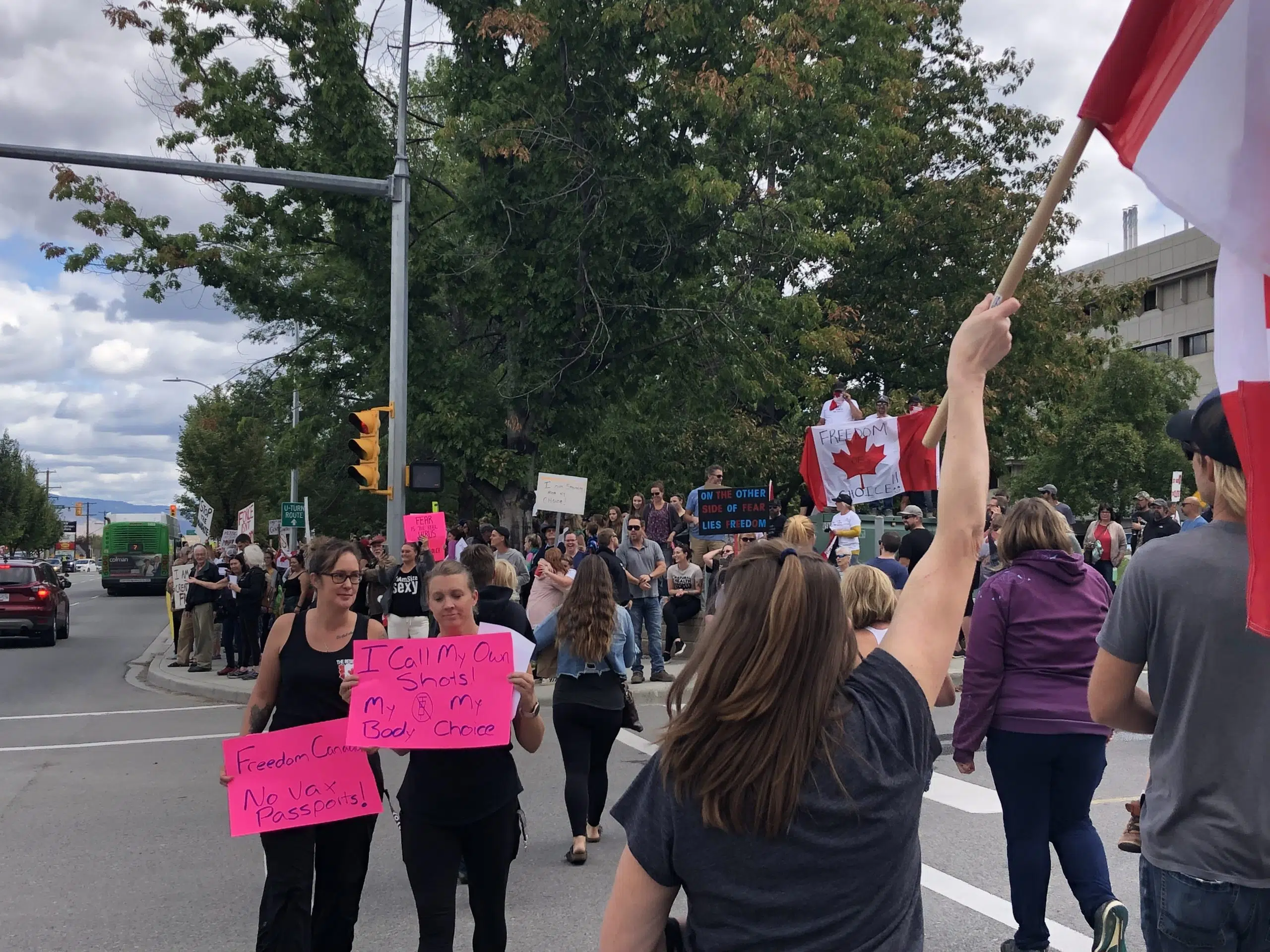
People outside of Royal Inland Hospital on Sep. 1, 2021, protesting new vaccine restrictions for the unvaccinated.
Royal Inland Hospital is currently seeing its worst influx of COVID-19 patients “by far,” according to an emergency room physician.
Dr. Eric Haywood-Farmer said almost all of the COVID hospitalizations are people who are unvaccinated. He said 12 out of 17 intensive care beds in RIH are being occupied by COVID patients.
“I think what people don’t realize is what’s sacrificed when so much of our time and energy is taken up with COVID patients. One of our general surgeons, she was walking past that big protest on Columbia Street… having had her operating room slate cancelled for the day. Those are all cancer surgeries,” Haywood-Farmer said.
“All of those people with cancer are having their surgeries put off, due to the hospital being overwhelmed with people with COVID. And so you have young, healthy people who could’ve been vaccinated, who are taking the hospital beds of people who need cancer surgery. That’s really what it comes down to. And it’s frustrating, and it’s disappointing that a year and a half into this, we’re still doing this.”
He added for some ICU patients, it can take months before they are taken off of a ventilator, which he said is a “very miserable experience” for those patients.
“Even the people I’m seeing who are relatively well and are able to go home, they’re not on a ventilator, they feel horrible. They have this horrible headache and chest pain, and it hurts when they breathe and they’re aching all over. And there is nothing I can do for them other than give them Advil… They’re coming in after nine or 10 days of really bad symptoms, and there’s nothing else I can do for them.”
Haywood-Farmer said unvaccinated hospital patients include some people who are completely resistant to getting the COVID-19 vaccine. But he said that’s a minority, adding most simply have put off getting the vaccine.
“In Kamloops, I think people really felt the pandemic had kind of passed us by, like we’d seen the worst of it. And I think we’ve been really lucky so far. And that has led to a lot of particularly young people who tend to see themselves as invincible, thinking that it really didn’t matter that they’d get vaccinated or not. And unfortunately they’re having to live with that decision.”
As for hundreds of people protesting new restrictions for unvaccinated people at street level on Wednesday, outside of RIH, Haywood-Farmer said there was a “general sense of disgust” from hospital staff.
“We’ve been working really, really hard for a year and a half under difficult conditions to battle this virus… We’re dealing with our worst ever wave of COVID in the hospital. And there’s all these people outside protesting a virus. Well guess what guys, the COVID virus doesn’t read your placards,” he said.
“And I’m sure that we’re going to see another increased wave of COVID in two weeks after all of those people on the street were giving each other the virus. Because I can guarantee at least one of them had it.”
Daily new cases of the virus have continued to rise significantly in the past month, with 785 new cases on Wednesday, 13 additional hospitalizations and 12 more people in ICU. As of yesterday, there were 199 people in hospital and 112 ICU patients, compared to 55 hospitalizations and 23 people in ICU four weeks earlier.
The new BC Status Card will come into effect on Sep. 13, meaning people who are unvaccinated will not be allowed into non-essential business. Premier John Horgan has said it will be a temporary measure until January as officials encourage more people to get vaccinated, to reduce COVID-19 cases, hospitalizations and deaths.
While hundreds protested the new restrictions, and some businesses have said they won’t enforce that mandate, many people have also spoken out about B.C. health officials not making an exception in its rules for people who medically cannot be vaccinated.
Other provinces with similar new mandates, including Ontario and Quebec, have declared they will allow unvaccinated into non-essential businesses who are medically exempt.











